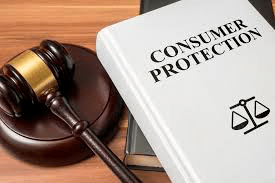The Consumer Credit Protection Act (CCPA) is a piece of federal legislation that puts in place consumer protections against lenders assed in 1968, the law requires lenders to explain the actual cost of borrowing money in terms the consumer understands. The CCPA includes several important laws, including the Truth in Lending Act, Fair Credit Reporting Act, and Fair Debt Collection Practices Act.
Deeper definition
The CCPA was the first federal consumer protection legislation. It contains several laws regulating specific aspects of the lending industry.
-Title I of the act outlines how lenders explain loan terms to borrowers.
– For wage garnishments title III provides federal guidelines
-Title VI contains guidelines for credit reporting agencies.
-Truth in Lending Act: Part of the original legislation the Truth in Lending Act protects consumers from deceptive advertising and unfair billing practices. Under this act, also known as Title I, lenders must provide consumers with the complete cost of the loan. So they can shop around to find the best loan for their financial situation. The act regulates how lenders advertise their loan products and strictly prohibits the practice of encouraging borrowers to choose loans that benefit the lender at the expense of the consumer. It gives consumers the right of rescission, which allows them up to three days to change their mind about the loan after signing the paperwork.
Title III:
Title III: Title III of the CCPA specifies guidelines for employers who have employees subject to wage garnishment. It limits the amount of the garnishment to 25 percent of the employee’s income after taking out mandatory payroll and income taxes. But it allows up to 50 percent garnishment of wages to pay for child support, taxes, and bankruptcy judgments. According to Title III, a debtor must have a court order to establish the wage garnishment. This section also protects the employee’s job, as the employer cannot fire an employee with a single debt under garnishment.Fair
Credit Reporting Act:
Credit Reporting Act: The Fair Credit Reporting Act regulates how credit-reporting agencies use consumers’ personal information under this law, credit-reporting agencies must tell consumers when an organization uses information from their file to deny credit or employment, they must correct inaccurate information and report only current information. It also gives consumers the right to verify their files and protect their personal information.
These rights include the following:
To know what information is in the consumer’s file.
Ask for a credit score.To dispute inaccurate information.
To give consent before a reporting agency shares information with an employer. Limiting the number of prescreened credit offers extended due to information in the credit report. To seek damages from violators of the FCRA.
The FCRA also specifies protections for victims of identity theft and active-duty military personnel. These protections include the right to ask for fraud alerts on files. Hat let creditors know of a potential identity theft. The right to a free copy of all the information contained in the credit file plus any documents relating to fraudulent transactions, and the right to ask reporting agencies to remove information related to fraudulent transactions.
Consumer Credit Protection

